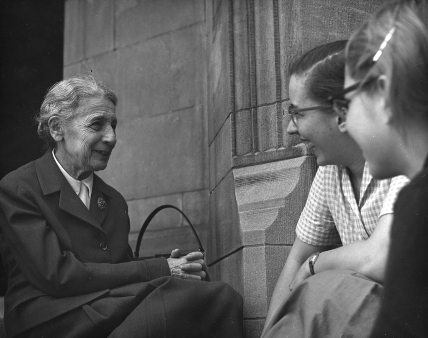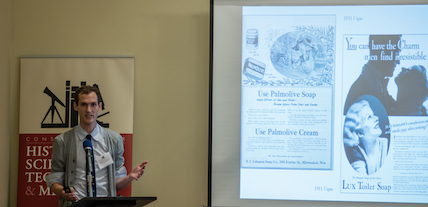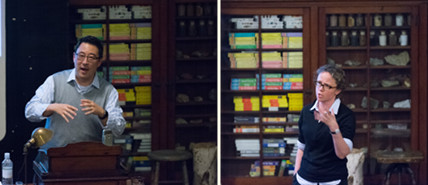
431 Chestnut Street, Philadelphia PA 19106 www.chstm.org
|
News of the Consortium
November 2015

Lise Meitner, who helped to discover nuclear fission, talking with students at Bryn Mawr College in the late 1950s.
Image courtesy of the American Institute of Physics
Each year the Consortium awards approximately 12-18 fellowships for conducting research in the extraordinary collections of member institutions. Fellows also participate in the Consortium's academic events and working groups. In the past year, our fellows have conducted research on a diverse and fascinating range of topics, including twentieth-century Japanese-American horticulture and its public representation; missionaries and native peoples' maps of the Amazon; medical experts' theories of physiology, health and disease during the era of America slavery; and the use of prosthetic limbs in 17th-century Germany.
Fellows' research helps to provide new understandings of past knowledge and practices and to provide new perspectives on contemporary issues. Like other historians, they examine documents and artifacts, compare them with each other, with items held elsewhere and with other sources of historical evidence such as interviews and contemporary understandings of natural phenomena. They explicate the questions that people asked in the past and the answers they produced. Those questions and answers, when understood in their own contexts, are often very different from ours. Fellows also produce translations from the records of the past for contemporary audiences and often pose questions about the past that address concerns we hold now, providing historical perspective for our concerns.
The Consortium's recent support for scholars using the collections of member institutions is described below.
|
| Fellowships |
Research Reports
|

|
Nicole Belolan , University of Delaware
2014-2015 Research Fellow
Navigating the World: The Material Culture of Physical Mobility Impairment in the Early American North, 1700-1861.
|

|
Amanda Casper, University of Delaware
2014-2015 Dissertation Writing Fellow
Home Alteration in Industrial Philadelphia, 1865 to 1925.
|

|
Abe Gibson, Florida State University
2014-2015 Postdoctoral Fellow
In Search of the Social Impulse: Science and Conciliation during the Interwar Years, 1919-1939.
|

|
Heidi Hausse, Princeton University
2014-2015 Dissertation Writing Fellow
Life and Limb: Technology, Surgery, and Bodily Loss in Early Modern Germany.
|

|
Sarah Naramore, Notre Dame University
2014-2015 Research Fellow
Revolutions in the Atmosphere: Benjamin Rush's Universal System of Medicine.
|

|
Whitney Robles, Harvard University
2015-2016 Research Fellow
Gathering the Animals: Natural History in America to 1815.
|

|
Jeannie Shinozuka, University of Urbana-Champaign
2014-2015 Research Fellow
U.S. Biological Nativism and Japanese Invasions: Constituting Race through Transnational Public Health and Agriculture, 1880-1861.
|

|
Roberto Chauca Tapia, University of Florida
2014-2015 Dissertation Writing Fellow
Science in the Jungle: The Missionary Mapping and National Imagining of Amazonia.
|

|
Christopher Willoughby, Tulane University
2014-2015 Research Fellow
Treating the Black Body: Race and Medicine in American Culture, 1800-1861.
|
Fellows Updates
|
The Consortium's past and current fellows have been busy:
|

|
Carin Berkowitz, Chemical Heritage Foundation
2009-2010 Dissertation Writing Fellow
Berkowitz's book
Charles Bell and the Anatomy of Reform was published this year with the University of Chicago Press. A Forum that Berkowitz edited and in which she has an article,
"Beyond Illustrations: Doing Anatomy with Images and Objects," was recently published by the Bulletin of the History of Medicine and was featured on JHU Press's blog. The Forum was based on a workshop hosted by the Consortium in the fall of 2012.
|

|
Abe Gibson, Florida State University
2014-2015 Postdoctoral Fellow
Abe Gibson's chapter "Invasive Species as Environmental Disaster" is forthcoming in Disaster and Risk in the Gulf South, edited by Cindy Ermus (Louisiana University Press, 2016).
|

|
Heidi Hausse, Princeton University
2014-2015 Dissertation Writing Fellow
Hausse was awarded a Mellon/ACLS Dissertation Completion Fellowship for 2015-2016. Her article "Bones of Contention: The Decision to Amputate in Early Modern Germany," is forthcoming in the Sixteenth Century Journal. She recently presented a paper, "Setting the Record Straight: The Invention of Mechanical Limbs in Sixteenth-Century Europe," at the Society for the History of Technology (SHOT), and was awarded Honorable Mention (runner-up) for the Robinson Prize.
|

|
Phillip Honenberger, Temple University
2015-2016 Fellow-In-Residence
Honenberger's article "Grene and Hull on Types and Typological Thinking in Biology" appeared in the May 2015 issue of Studies in History and Philosophy of Biological and Biomedical Sciences. A collection of new essays of which he is the editor, entitled Naturalism and Philosophical Anthropology, was published by Palgrave Macmillan press in October 2015. He also completed two encyclopedia articles on David Lee Hull (1935-2010) and Evelyn Fox Keller (1936-), which are forthcoming in The Dictionary of Modern American Philosophers, 2nd edition, ed. John Shook (Bloomsbury), and a review essay that is forthcoming in Philosophy of the Social Sciences.
|

|
Christopher Jones, Arizona State University
2008-2009 Dissertation Writing Fellow
Jones's book Routes of Power: Energy and Modern America (Harvard, 2014) was recently awarded the Edelstein Prize by the Society for the History of Technology, given to the outstanding scholarly book published in the past three years. Jones's research for that book was partially supported with a Consortium fellowship.
|

|
Joseph Malherek, George Washington University
2015-2016 NEH Postdoctoral Fellow
Three of Malherek's papers were recently accepted for publication and are slated to appear in 2016: "Shopping Malls and Social Democracy: Victor Gruen's Postwar Campaign for Conscientious Consumption in American Suburbia" in Consumer Engineering: Marketing between Planning Euphoria and the Limits of Growth, 1930s to 1970s, eds. Gary Cross, Ingo Köhler, and Jan Logemann; "Victor Gruen's Retail Therapy: Exiled Jewish Communities and the Invention of the American Shopping Mall as a Postwar Ideal," Leo Baeck Institute Year Book; and "From the Ringstraße to Madison Avenue: Commercial Market Research and the Viennese Origins of the Mass Culture Debate, 1941-1961," Canadian Review of American Studies.
|

|
Joseph Martin, Michigan State University
2011-2012 Dissertation Writing Fellow
Martin is currently in the History, Philosophy, and Sociology of Science unit at Lyman Briggs College, Michigan State University. Together with Michel Janssen, he co-edited a special issue of Historical Studies in the Natural Sciences, titled "Making the History of Physics Dirtier: Solid State Physics in the Twentieth Century," which appears in November 2015. He and Richard Bellon recently assumed the co-editorship of Endeavour and encourage submissions from friends of the Consortium.
|

|
Emily Klancher Merchant, University of Michigan
2012-2013 Dissertation Writing Fellow
Merchant finished her Ph.D. in History at the University of Michigan and began a postdoc at Dartmouth College, in the Neukom Institute for Computational Science and the Department of History.
|

|
Donald L. Opitz, DePaul University
2013-2014 Reasearch Fellow
Opitz secured NSF funding to support the conference "Gendering Science: Women and Men Producing Knowledge" in Prague, Czech Republic, June 5-8, 2015. Opitz also lead-edited a volume of fourteen new essays on domesticity in modern science: Domesticity in the Making of Modern Science, ed. Donald L. Opitz, Staffan Bergwik, Brigitte Van Tiggelen (Palgrave Macmillan, 2015).
|
Postdoctoral, Dissertation and Research
Fellowships for 2016-17
The Consortium invites applications for 2016-17 fellowships. Applications are due by January 5, 2016 and awards will be announced in February 2016.
|
|
| Events |

Maxwell Rogoski of UPenn presenting his dissertation at the 2015 Introductory Symposium.
The Consortium held its fifth annual Introductory Symposium in September 2015. The Symposium featured 24 scholars presenting 10-minute synopses of their current research projects to an audience of approximately 50 fellow scholars, archivists, and others. For the first time, the Consortium live-streamed the Introductory Symposium on its website, where it was viewed by people across the U.S. and Canada and from as far away as Italy, the Netherlands, India and Taiwan. Presentations included such topics as the use of new plastics technologies in 1960s conceptual art; the history of fruit fly genetics research in Spain; late twentieth-century efforts to regulate and dispose of the "space junk" now circling the earth's atmosphere; and the tradition of military medicine in Japan.

Carolyn Roberts of Harvard University, 2015-16 Consortium Dissertation Fellow, discussing a chapter of her dissertation at the American Philosophical Society in a seminar of the McNeil Center for Early American Studies, moderated by the Director of the McNeil Center, Daniel K. Richter.
In October, Carolyn Roberts discussed her paper, "The Mortar, the Pestle, and the Slave Trade: British Pharmacy and Slave Trading in the Eighteenth Century," with an audience of fellow scholars and the public at the American Philosophical Society. The paper examined pharmaceutical dimensions of the British slave trade, including the processes involved in getting medicines onto slave ships and into British forts and settlements in West Africa. Roberts is a Ph.D. candidate in African and African American Studies at Harvard University and a 2015-2016 Dissertation Writing Fellow at the Consortium. The event was co-organized by the Consortium, the American Philosophical Society, and the McNeil Center for Early American Studies.

Youngmoo Kim and Heidi Voskhul discussing contemporary and historical androids at the Wagner Free Institute in October.
Finally, the Consortium teamed up again with the Wagner Free Institute of Science to present its annual Halloween event. This year's program, Dancing with Droids, featured talks from Heidi Voskuhl (University of Pennsylvania) on androids in the 18th century and from Youngmoo Kim (Drexel University) on contemporary research on humanoid robots and their applications in both science and music.
|
Working Groups |
In addition to its public events, the Consortium offers small, intensive reading groups for advanced graduate students, professors, and independent scholars. The Consortium's 10 currently active working groups meet monthly to discuss pre-circulated working papers, published articles, and book chapters on specialized topics in the history of science, technology and medicine. Scholars can participate in person at the Consortium's offices in Philadelphia, or online via an easy-to-use video conferencing system. Current groups include History and Theory, History of Biological Sciences, History of Physical Sciences, History and Philosophy of Science, History of Technology, History of Medicine and Health, Science Beyond the West, History of Early Sciences, History of Earth and Environmental Sciences, and History of the Human Sciences. If you would like to join a working group, please contact the conveners, whose contact information is available on the working groups' webpage.
|
| Collections |
New Members |
The Consortium welcomed five new member institutions in the summer of 2015. With their inclusion, the Consortium now numbers 24 members who bring exceptional collective resources to the study of history of science, technology and medicine.
Cold Spring Harbor Laboratory in Cold Spring Harbor, NY, has played a central role in the development of molecular genetics and molecular biology. Its collections include history of science at Cold Spring Harbor, and the history of molecular biology, genetics and biotechnology, in general.
The History of Science Society is the world's largest society dedicated to understanding science, technology, medicine and their interactions with society in historical context.
The Newberry Library in Chicago, IL, holds abundant sources for primary research with large collections of scientific almanacs from the 16th century on, as well as materials on the history of printing and the book arts, sources for the study of biology, botany, zoology, geology, agriculture, horticulture and other natural and earth sciences, with a particular concentration on the Midwest and the American West.
Oregon State University in Corvallis, OR, holds collections with particular strengths in the life sciences, environmental sciences and nuclear issues, including the Ava Helen and Linus Pauling collection spanning the history of chemistry, biomedical research, radiation effects and peace activism. Twentieth century strengths are balanced by a diverse collection of early modern, 18th, and 19th century works with concentrations in herbals and botany, early chemistry, electricity and science education for children.
The Rockefeller Archive Center in Sleepy Hollow, NY, is a repository of historic documents in a wide variety of media and a research center dedicated to the study of philanthropy and the diverse domains shaped by philanthropy. It is also a major repository for the personal papers of leaders of the philanthropic community, Nobel Prize laureates and world-renowned investigators in science and medicine.
| Newly Acquired or Processed Collections |
The American Philosophical Society has recently acquired the papers of twentieth-century physicist and policy consultant Richard L. Garwin. Garwin was instrumental in the development of the hydrogen bomb and spent nearly fifty years addressing policy questions pertaining to its use, as well as the use of other advanced technologies, in addition to a continued and wide-ranging career in both basic and applied physical research. Garwin authored or co-authored many books, including Nuclear Weapons and World Politics (1977) and Science Advice to the President (1980), and more than 500 articles in scientific and popular media. He was elected to the American Academy of Arts and Sciences and the American Philosophical Society, among other esteemed organizations, and has held many posts, including as consultant and researcher for IBM and as consultant to the U.S. President's Science Advisory Committee.
The Linda Hall Library has recently acquired 26 observation logs from David H. Levy, one of the most successful comet hunters in history, with 22 comets discovered, nine of them using his own backyard telescopes. The logs given to the Linda Hall Library date from 1956 when, at age eight, Levy accidentally saw a shooting star during the summer. He has kept an observation log ever since, totaling 18,000 sessions. Levy also donated an equal number of his personal journals which help explain the information contained within the observation logs. The remainder of Dr. Levy's observation logs and journals will be donated to the Library after his death.
|
| Thank You for Your Support |
Everything we do is made possible by the generosity of our individual and institutional supporters. Gifts of any level will help us to better promote public and academic understanding of the history of science, technology and medicine.
If you have given in the past, please renew your support. If not, add your name to our growing list of supporters.
With best regards,

Babak Ashrafi, Executive Director
Consortium for History of Science, Technology and Medicine
431 Chestnut Street, Philadelphia, Pennsylvania 19106
|
| | |
The Consortium for History of Science, Technology and Medicine
American Institute of Physics ♦ American Philosophical Society ♦ Chemical Heritage Foundation
Cold Spring Harbor
Laboratory ♦ College of Physicians of Philadelphia ♦ Columbia University
Drexel University ♦ Franklin Institute ♦ Hagley Museum and Library
Historical Society of Pennsylvania ♦ History of Science Society ♦ Johns Hopkins University
Library Company of Philadelphia ♦ Linda Hall Library ♦ Newberry Library
New York Academy of Medicine ♦ Oregon State University ♦ Princeton University
Rockefeller Archive Center ♦ Smithsonian Institution ♦ University of Pennsylvania
University of Toronto ♦ Wagner Free Institute of Science ♦ Yale University
Home
Events
Fellowships
Collections
Groups
Contact
|
|